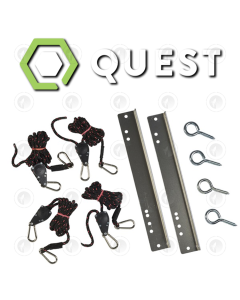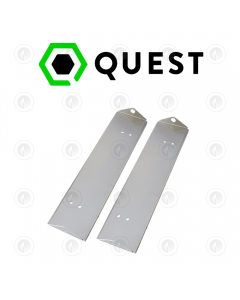Quest 70 Replacement Filter MERV-13 - 23CM X 28CM X 2CM
Online Purchase Available
Air filters are rated based on the MERV scale, which stands for Minimum Efficiency Reporting Value. The higher the MERV, the more particulates filters collect. While air filters with a MERV of one to four are effective at removing large particulates like carpet fibers, airborne paint droplets, and sanding dust, they can't help with contaminants like hair spray, mold spores, or even flour that might have escaped your mixer.
However, high-MERV filters offer superior filtration, trapping everything from construction dust and tobacco smoke to bacteria.
By installing an air filter with a high MERV rating, two things happen. First and foremost, your air becomes cleaner, which can help improve the longevity of your HVAC system. The more particulates that are trapped, the fewer get stuck to the interior of your vent work, and the better the airflow becomes.
Additionally, high-MERV air filters that contain pleats create a lot more surface area for air to blow over, which can improve airflow and reduce the strain on your system. In fact, researchers have found that while high-MERV filters can create some pressure drop, the impact isn't
significant unless your filter is laden with dirt.
- Add resistance to the airflow
- Increase the pressure in the duct system
- Increase the energy use of the system
- Reduce the airflow
- Cause comfort problems
- Freeze the air conditioner coil
- Damage the compressor
- Crack the heat exchanger
- Put carbon monoxide in your home
- Dehumidify better
- The Quest 70 is equipped with a MERV 13 media filter. This filter should be checked every three months. Operating the unit with a dirty filter will reduce dehumidifier capacity and efficiency and may cause the compressor to cycle off and on unnecessarily on the defrost control.
- DO NOT operate the unit without a filter or with a less-effective filter. Operating the unit without a filter or with a less effective filter may cause internal damage to the unit and invalidate the product warranty.
Optional Fresh Air Intake
- Check and clean the screen on the outdoor fresh air intake port seasonally. The screen may become plugged during the seasons when there are many particles in the outdoor air.
- To replace the filter, remove the filter door from one of the sides of the Quest 70 by pushing the snap button in and gently pulling to door away from the body of the unit, then pulling up to disengage the door flange from the slot, removing the door.
(1).png)
Remove the filter by gently pulling straight out of the unit. Insert the new filter in the same manner, pushing it gently straight into the unit. Replace the filter door by inserting the bottom tab into the slot, aligning the door, and pushing it gently against the unit until the snap button secures the door.





